香港大律师工会对外籍律师申请香港执业的要求
香港高院 委托代理人范围
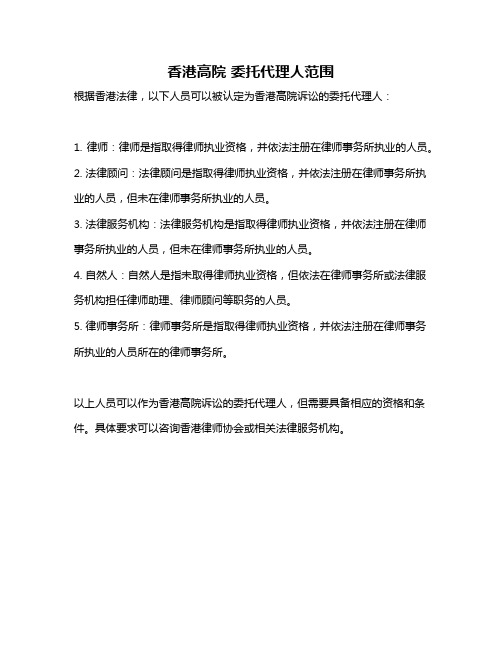
香港高院委托代理人范围
根据香港法律,以下人员可以被认定为香港高院诉讼的委托代理人:
1. 律师:律师是指取得律师执业资格,并依法注册在律师事务所执业的人员。
2. 法律顾问:法律顾问是指取得律师执业资格,并依法注册在律师事务所执业的人员,但未在律师事务所执业的人员。
3. 法律服务机构:法律服务机构是指取得律师执业资格,并依法注册在律师事务所执业的人员,但未在律师事务所执业的人员。
4. 自然人:自然人是指未取得律师执业资格,但依法在律师事务所或法律服务机构担任律师助理、律师顾问等职务的人员。
5. 律师事务所:律师事务所是指取得律师执业资格,并依法注册在律师事务所执业的人员所在的律师事务所。
以上人员可以作为香港高院诉讼的委托代理人,但需要具备相应的资格和条件。
具体要求可以咨询香港律师协会或相关法律服务机构。
香港执业律师条例(香港律师法)
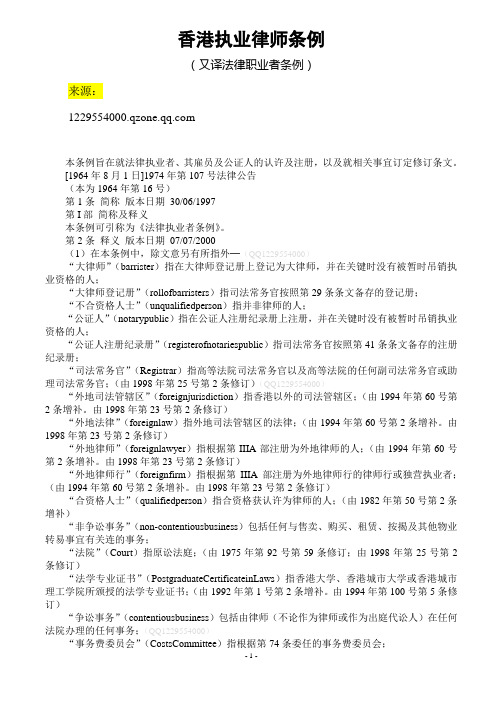
香港执业律师条例(又译法律职业者条例)来源:本条例旨在就法律执业者、其雇员及公证人的认许及注册,以及就相关事宜订定修订条文。
[1964年8月1日]1974年第107号法律公告(本为1964年第16号)第1条简称版本日期30/06/1997第I部简称及释义本条例可引称为《法律执业者条例》。
第2条释义版本日期07/07/2000(1)在本条例中,除文意另有所指外─(QQ1229554000)“大律师”(barrister)指在大律师登记册上登记为大律师,并在关键时没有被暂时吊销执业资格的人;“大律师登记册”(rollofbarristers)指司法常务官按照第29条条文备存的登记册;“不合资格人士”(unqualifiedperson)指并非律师的人;“公证人”(notarypublic)指在公证人注册纪录册上注册,并在关键时没有被暂时吊销执业资格的人;“公证人注册纪录册”(registerofnotariespublic)指司法常务官按照第41条条文备存的注册纪录册;“司法常务官”(Registrar)指高等法院司法常务官以及高等法院的任何副司法常务官或助理司法常务官;(由1998年第25号第2条修订)(QQ1229554000)“外地司法管辖区”(foreignjurisdiction)指香港以外的司法管辖区;(由1994年第60号第2条增补。
由1998年第23号第2条修订)“外地法律”(foreignlaw)指外地司法管辖区的法律;(由1994年第60号第2条增补。
由1998年第23号第2条修订)“外地律师”(foreignlawyer)指根据第IIIA部注册为外地律师的人;(由1994年第60号第2条增补。
由1998年第23号第2条修订)“外地律师行”(foreignfirm)指根据第IIIA部注册为外地律师行的律师行或独营执业者;(由1994年第60号第2条增补。
由1998年第23号第2条修订)“合资格人士”(qualifiedperson)指合资格获认许为律师的人;(由1982年第50号第2条增补)“非争讼事务”(non-contentiousbusiness)包括任何与售卖、购买、租赁、按揭及其他物业转易事宜有关连的事务;“法院”(Court)指原讼法庭;(由1975年第92号第59条修订;由1998年第25号第2条修订)“法学专业证书”(PostgraduateCertificateinLaws)指香港大学、香港城市大学或香港城市理工学院所颁授的法学专业证书;(由1992年第1号第2条增补。
香港的法律援助制度
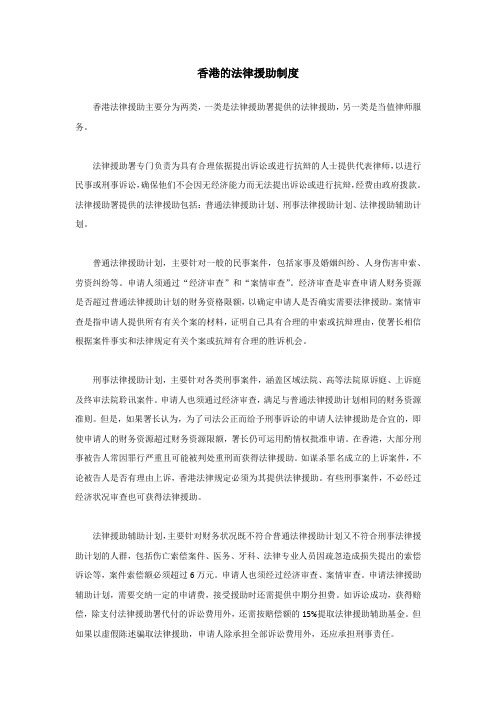
香港的法律援助制度香港法律援助主要分为两类,一类是法律援助署提供的法律援助,另一类是当值律师服务。
法律援助署专门负责为具有合理依据提出诉讼或进行抗辩的人士提供代表律师,以进行民事或刑事诉讼,确保他们不会因无经济能力而无法提出诉讼或进行抗辩,经费由政府拨款。
法律援助署提供的法律援助包括:普通法律援助计划、刑事法律援助计划、法律援助辅助计划。
普通法律援助计划,主要针对一般的民事案件,包括家事及婚姻纠纷、人身伤害申索、劳资纠纷等。
申请人须通过“经济审查”和“案情审查”。
经济审查是审查申请人财务资源是否超过普通法律援助计划的财务资格限额,以确定申请人是否确实需要法律援助。
案情审查是指申请人提供所有有关个案的材料,证明自己具有合理的申索或抗辩理由,使署长相信根据案件事实和法律规定有关个案或抗辩有合理的胜诉机会。
刑事法律援助计划,主要针对各类刑事案件,涵盖区域法院、高等法院原诉庭、上诉庭及终审法院聆讯案件。
申请人也须通过经济审查,满足与普通法律援助计划相同的财务资源准则。
但是,如果署长认为,为了司法公正而给予刑事诉讼的申请人法律援助是合宜的,即使申请人的财务资源超过财务资源限额,署长仍可运用酌情权批准申请。
在香港,大部分刑事被告人常因罪行严重且可能被判处重刑而获得法律援助。
如谋杀罪名成立的上诉案件,不论被告人是否有理由上诉,香港法律规定必须为其提供法律援助。
有些刑事案件,不必经过经济状况审查也可获得法律援助。
法律援助辅助计划,主要针对财务状况既不符合普通法律援助计划又不符合刑事法律援助计划的人群,包括伤亡索偿案件、医务、牙科、法律专业人员因疏忽造成损失提出的索偿诉讼等,案件索偿额必须超过6万元。
申请人也须经过经济审查、案情审查。
申请法律援助辅助计划,需要交纳一定的申请费,接受援助时还需提供中期分担费。
如诉讼成功,获得赔偿,除支付法律援助署代付的诉讼费用外,还需按赔偿额的15%提取法律援助辅助基金。
但如果以虚假陈述骗取法律援助,申请人除承担全部诉讼费用外,还应承担刑事责任。
香港执业:海外律师资格考试(OLQE)
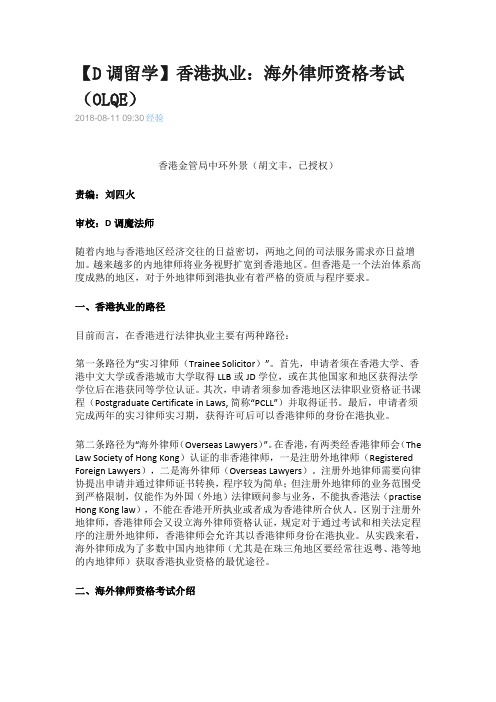
【D调留学】香港执业:海外律师资格考试(OLQE)2018-08-11 09:30经验香港金管局中环外景(胡文丰,已授权)责编:刘四火审校:D调魔法师随着内地与香港地区经济交往的日益密切,两地之间的司法服务需求亦日益增加。
越来越多的内地律师将业务视野扩宽到香港地区。
但香港是一个法治体系高度成熟的地区,对于外地律师到港执业有着严格的资质与程序要求。
一、香港执业的路径目前而言,在香港进行法律执业主要有两种路径:第一条路径为“实习律师(Trainee Solicitor)”。
首先,申请者须在香港大学、香港中文大学或香港城市大学取得LLB或JD学位,或在其他国家和地区获得法学学位后在港获同等学位认证。
其次,申请者须参加香港地区法律职业资格证书课程(Postgraduate Certificate in Laws, 简称“PCLL”)并取得证书。
最后,申请者须完成两年的实习律师实习期,获得许可后可以香港律师的身份在港执业。
第二条路径为“海外律师(Overseas Lawyers)”。
在香港,有两类经香港律师会(The Law Society of Hong Kong)认证的非香港律师,一是注册外地律师(Registered Foreign Lawyers),二是海外律师(Overseas Lawyers)。
注册外地律师需要向律协提出申请并通过律师证书转换,程序较为简单;但注册外地律师的业务范围受到严格限制,仅能作为外国(外地)法律顾问参与业务,不能执香港法(practise Hong Kong law),不能在香港开所执业或者成为香港律所合伙人。
区别于注册外地律师,香港律师会又设立海外律师资格认证,规定对于通过考试和相关法定程序的注册外地律师,香港律师会允许其以香港律师身份在港执业。
从实践来看,海外律师成为了多数中国内地律师(尤其是在珠三角地区要经常往返粤、港等地的内地律师)获取香港执业资格的最优途径。
二、海外律师资格考试介绍要想成为海外律师,必须通过香港律师会举办的海外律师资格考试(Overseas Lawyers Qualification Examination,以下简称“OLQE”)。
香港《法律执业者条例》

香港《法律执业者条例》章:159 《法律執業者條例》憲報編號版本日期詳題L.N. 60 of 2005 30/06/2005本條例旨在就法律執業者及其僱員的認許及註冊、就公證人的委任及註冊,以及就相關事宜訂定修訂條文。
(由1998年第27號第2條修訂)[1964年8月1日] 1974年第107號法律公告(本為1964年第16號)部:I 簡稱及釋義 30/06/1997 條: 1 簡稱 30/06/1997 本條例可引稱為《法律執業者條例》。
條: 2 釋義L.N. 163 of 201303/03/2014(1) 在本條例中,除文意另有所指外─“大律師”(barrister) 指在大律師登記冊上登記為大律師,並在關鍵時沒有被暫時吊銷執業資格的人;“大律師登記冊”(roll of barristers) 指司法常務官按照第29條條文備存的登記冊;“不合資格人士”(unqualified person) 指並非律師的人;“公證人”(notar y public) 指在公證人註冊紀錄冊上註冊,並在關鍵時沒有被暫時吊銷執業資格的人;“公證人協會”(Society of Notaries) 指名為香港國際公證人協會的團體,該團體根據在當其時有效的《公司條例》(第32章)成立為有限責任法團,其所具有的宗旨包括提高公證人的專業水平、規管公證人的執業,以及履行或執行根據本條例賦予該團體的職責或責任; (由1998年第27號第5條增補。
由2003年第206號法律公告修訂;由2012年第28號第912及920條修訂)“公證人協會理事會”(Council of the Society of Notaries) 指按照該協會的組織章程細則的條文委出的執行理事會; (由1998年第27號第5條增補)“公證人註冊紀錄冊”(register of notaries public) 指司法常務官按照第40C條條文備存的註冊紀錄冊;(由1998年第27號第5條修訂)“司法常務官”(Registrar) 指高等法院司法常務官以及高等法院的任何高級副司法常務官、副司法常務官或助理司法常務官;(由1998年第25號第2條修訂;由2005年第10號第175條修訂) “外地司法管轄區”(foreign jurisdiction) 指香港以外的司法管轄區; (由1994年第60號第2條增補。
香港注册工程师申请条件

香港注册工程师申请条件1.引言1.1 概述香港的注册工程师是一种经过严格审核和认证的专业人士,他们承担着监督和控制香港工程项目的职责。
作为一个国际金融中心和全球城市,香港拥有繁忙的建筑和基础设施发展计划,所以对注册工程师的需求非常高。
注册工程师不仅需要具备出色的技术能力和专业知识,还需要具备高度的职业道德和责任感。
在香港,注册工程师的地位非常受重视,他们在建设项目的各个阶段都起着重要的作用。
从规划和设计到实施和维护,注册工程师必须确保工程项目符合相关的法规和标准,并且能够安全、高效地运行。
他们还负责监督工地的施工过程,确保施工符合设计要求,遵循安全操作规程,保障员工和公众的安全。
为了成为一名香港注册工程师,申请人需要满足一定的条件。
首先,他们必须取得相关工程学士学位,并具备一定的工作经验。
此外,申请人还需要通过香港注册工程师协会的专业资格考试,以证明他们在该领域具备足够的知识和技能。
通过考试后,申请人还需要进行实习,并由一名注册工程师担任导师进行指导和评估。
香港注册工程师申请条件的确立旨在确保注册工程师具备高品质的专业水准,并能够胜任复杂的工程项目。
这些条件的设定也有助于维护香港的建筑和基础设施的质量和安全性,为城市的可持续发展做出贡献。
在未来,随着香港不断发展壮大,对注册工程师的需求将继续增加。
随着科技的进步和创新的推动,注册工程师也需要不断更新自己的知识和技能,以适应不断变化的工程需求和挑战。
因此,对香港注册工程师的申请条件的展望是,将会越来越注重专业能力的提升和持续学习的重要性。
同时,加强注册工程师与相关行业的合作和交流也将成为未来发展的趋势,以促进工程领域的创新和协同发展。
1.2 文章结构文章结构部分的内容如下:文章结构部分旨在介绍本篇长文的整体结构和组织方式,以便读者能够更好地理解和阅读后续的内容。
本文将按照以下结构进行论述:1. 引言:首先,我们会概述本文的主题——香港注册工程师申请条件,并说明本文的结构和目的。
港澳台与内地律师制度之比较
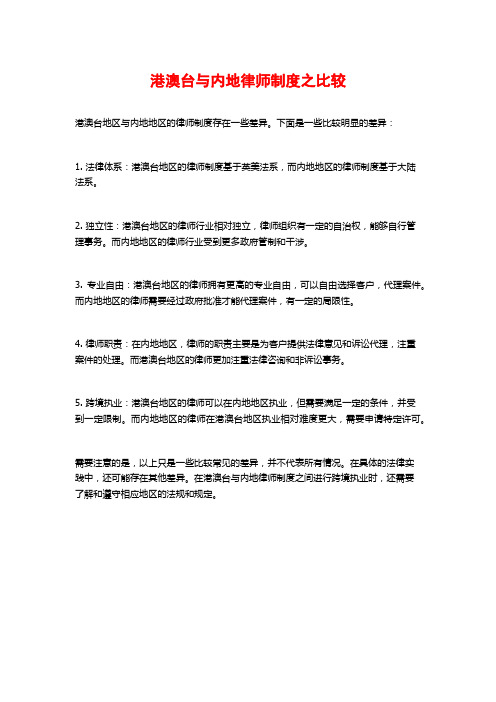
港澳台与内地律师制度之比较
港澳台地区与内地地区的律师制度存在一些差异。
下面是一些比较明显的差异:
1. 法律体系:港澳台地区的律师制度基于英美法系,而内地地区的律师制度基于大陆
法系。
2. 独立性:港澳台地区的律师行业相对独立,律师组织有一定的自治权,能够自行管
理事务。
而内地地区的律师行业受到更多政府管制和干涉。
3. 专业自由:港澳台地区的律师拥有更高的专业自由,可以自由选择客户,代理案件。
而内地地区的律师需要经过政府批准才能代理案件,有一定的局限性。
4. 律师职责:在内地地区,律师的职责主要是为客户提供法律意见和诉讼代理,注重
案件的处理。
而港澳台地区的律师更加注重法律咨询和非诉讼事务。
5. 跨境执业:港澳台地区的律师可以在内地地区执业,但需要满足一定的条件,并受
到一定限制。
而内地地区的律师在港澳台地区执业相对难度更大,需要申请特定许可。
需要注意的是,以上只是一些比较常见的差异,并不代表所有情况。
在具体的法律实
践中,还可能存在其他差异。
在港澳台与内地律师制度之间进行跨境执业时,还需要
了解和遵守相应地区的法规和规定。
香港大律师公会专业守则
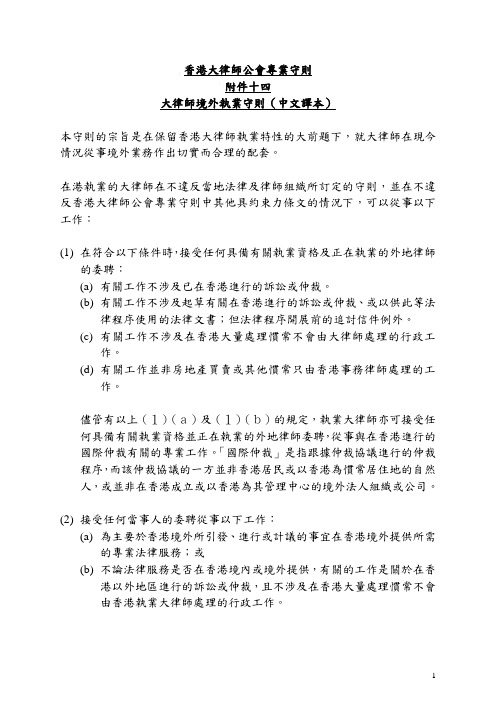
香港大律師公會專業守則附件十四大律師境外執業守則(中文譯本)本守則的宗旨是在保留香港大律師執業特性的大前題下,就大律師在現今情況從事境外業務作出切實而合理的配套。
在港執業的大律師在不違反當地法律及律師組織所訂定的守則,並在不違反香港大律師公會專業守則中其他具約束力條文的情況下,可以從事以下工作:(1)在符合以下條件時,接受任何具備有關執業資格及正在執業的外地律師的委聘:(a)有關工作不涉及已在香港進行的訴訟或仲裁。
(b)有關工作不涉及起草有關在香港進行的訴訟或仲裁、或以供此等法律程序使用的法律文書;但法律程序開展前的追討信件例外。
(c)有關工作不涉及在香港大量處理慣常不會由大律師處理的行政工作。
(d)有關工作並非房地產買賣或其他慣常只由香港事務律師處理的工作。
儘管有以上(1)(a)及(1)(b)的規定,執業大律師亦可接受任何具備有關執業資格並正在執業的外地律師委聘,從事與在香港進行的國際仲裁有關的專業工作。
「國際仲裁」是指跟據仲裁協議進行的仲裁程序,而該仲裁協議的一方並非香港居民或以香港為慣常居住地的自然人,或並非在香港成立或以香港為其管理中心的境外法人組織或公司。
(2)接受任何當事人的委聘從事以下工作:(a)為主要於香港境外所引發、進行或計議的事宜在香港境外提供所需的專業法律服務;或(b)不論法律服務是否在香港境內或境外提供,有關的工作是關於在香港以外地區進行的訴訟或仲裁,且不涉及在香港大量處理慣常不會由香港執業大律師處理的行政工作。
(3)在符合以下條件的情況下,可接受在香港境外從事業務或慣常在香港境外居住的當事人或在香港境外執業的律師的委聘:(a)該委聘來自香港境外。
(b)該委聘不涉及大律師先前已通過在香港執業的事務律師所委托的事宜。
(c)有關工作不涉及已經在香港進行的訴訟或仲裁。
(d)有關工作不涉及起草有關在香港進行的訴訟或仲裁、或以供此等法律程序使用的法律文書;但法律程序開展前的追討信件例外。
- 1、下载文档前请自行甄别文档内容的完整性,平台不提供额外的编辑、内容补充、找答案等附加服务。
- 2、"仅部分预览"的文档,不可在线预览部分如存在完整性等问题,可反馈申请退款(可完整预览的文档不适用该条件!)。
- 3、如文档侵犯您的权益,请联系客服反馈,我们会尽快为您处理(人工客服工作时间:9:00-18:30)。
HONG KONG BAR ASSOCIATION ADMISSION OF OVERSEAS LAWYERSHONG KONG BAR ASSOCIATIONLG2, HIGH COURT38 QUEENSWAYHONG KONGTel: (852) 2869 0210Fax: (852) 2869 0189Email: bqe@I. INFORMATIONPACKAGE 2010CONTENTS PAGEI. INFORMATION PACKAGE1. Introduction (1)2. Overseas Lawyers (1)3. Requirements for Admission to the Hong Kong Bar (1)4. What is the Barristers Qualification Examination? (2)5. Frequency and Venue of the Barristers Qualification Examination (2)6. Deadlines (2)7. Application to sit the Barristers Qualification Examination (3)8. Certificate of Eligibility for Admission (3)9. Application for Exemption (4)10 The Application Form (4)11. Payment of Fees (5)12. Withdrawal from sitting the Examination (5)13. Examination Papers (6)14. Examination Procedure (6)15. Pass Requirements (6)16. Disqualification (6)17. Plagiarism (7)18. Examination Standard (7)19. Proficiency in the English Language (7)20. Preparation for the Barristers Qualification Examination (7)21. Use of the High Court Library (7)22. Examination Materials (7)23. Marking Procedure s (8)24. Examination Results (8)25. Applications to re-sit the Examination (8)26. Application for review of the Bar Council‟s decision (9)27. Examination Supplement (9)Annex A Schedule 1 to the Barristers (Qualification for Admission and Pupillage) RulesAnnex B Application Form for the Barristers Qualification ExaminationAnnex C Common Law JurisdictionsI. INFORMATION PACKAGE1.IntroductionThis Information Package explains how lawyers who have qualified otherwise than in accordance with section 27(1) of the Legal Practitioners Ordinance (Cap. 159) (“LPO”) can be called to the Hong Kong Bar. This applies to all overseas lawyers whether from common-law or non-common law jurisdictions.2.Overseas LawyersAn “overseas lawyer” is defined in section 2 of the Barristers (Qualification for Admission and Pupillage) Rules (“B(QAP)R”)as …a person who is entitled to practise the law of a foreign jurisdiction’.3.Requirements for Admission to the Hong Kong BarIn order to practise at the Hong Kong Bar, a person must first be admitted by the Court as a barrister of the High Court in Hong Kong. The power of the Court to admit barristers is governed by section 27 of the LPO, (as amended by the Legal Practitioners (Amendment) Ordinance 2000), and the Barristers (Qualification for Admission and Pupillage) Rules, which particularises the qualifications required for admission as a barrister under section 27 LPO.Section 4 of the B(QAP)R sets out the requirements for admission to the Bar.According to section 4(1), there are three criteria under which a person is qualified for admission as a barrister under section 27(1) LPO.These are that the person:(a)has obtained a Postgraduate Certificate in Laws; or(b)has been admitted as a solicitor in Hong Kong for at least 3 yearseither immediately or in any case not more than 12 months beforethe date of his application for admission and during that time hewas in practice as a solicitor in Hong Kong or employed in thepublic service of the Government as a legal officer within themeaning of the Legal Officers Ordinance (Cap. 87); or(c)is an overseas lawyer who satisfies the requirements specified insubsection (2).An overseas lawyer is therefore qualified for admission as a barrister under section 27(1) LPO if he satisfies the requirements set out in section 4(2) that he:(a)holds a certificate of admission as a legal practitioner from theappropriate authority in his jurisdiction of admission and suchcertificate is valid and currently in force;(b)has practised for at least 3 years in his jurisdiction of admission;(c)is a person of good standing in his jurisdiction of admission; and(d)has passed the Examination (excluding any examination paperwhich such person has been exempted from sitting pursuant tosubsections (4) and (5)).Normally, both Hong Kong and overseas lawyers will have to complete at least 6 months of the required period of approved pupillage before admission to the Bar. In exceptional circumstances, however, there is provision for a reduction in the period of approved pupillage in section 16 of the B(QAP)R.4.What is the Barristers Qualification Examination (“The Examination”)?The Examination will qualify overseas lawyers for pupillage and eventual practice at the Hong Kong Bar. It will be held once a year and will consist of five Papers based on the list of subjects in section 5(2) of the B(QAP)R.All five Papers are compulsory unless an applicant has obtained an exemption1 from sitting one or more of the Papers.The language for both written and oral papers will be English. More details on the Examination can be found in the Examination Supplement.5.Frequency and Venue of the Barristers Qualification ExaminationThe Examination will be held once every year and information will be provided as to dates and venue as soon as practicable. The next Examination will be held in late October 2010.6.Deadlines3rd May 2010Application for Certificate of Eligibility for Admissionif a person wishes to sit the Examination in October2010.5th July 2010 Application to sit the Examination.1see paragraph 9 below7.Application to sit the Barristers Qualification ExaminationTo apply to sit the Examination, an applicant should submit the following:1.an Application Form to sit the Examination (Annex B);2. a Certificate of Eligibility for Admission; and3.the non-refundable fee prescribed in Schedule 1 to the B(QAP)R,to the Bar Secretariat, Hong Kong Bar Association, LG2, High Court, 38 Queensway, Hong Kong by the registration dates specified above.8.Certificate of Eligibility for AdmissionAn overseas lawyer must first apply to the Bar Council for a Certificate of Eligibility for Admission. The Bar Council shall issue the Certificate of Eligibility for Admission upon being satisfied that the overseas lawyer has complied with section 6 and Form 1 of the B(QAP)R, and upon payment of a non-refundable fee as prescribed in Schedule 1 to the B(QAP)R.The closing date for receipt of applications for a Certificate of Eligibility is Monday 3rd May 2010.A Certificate of Eligibility for Admission is valid for 12 months from it‟s dateof issue, unless the Bar Council otherwise determines. Under sections 6(6)-(7) of the B(QAP)R, a person may apply to the Bar Council in writing for an extension of the validity period of the Certificate upon payment of the non-refundable fee of HK$250. An application for extension of the validity of a Certificate of Eligibility for Admission must be made not later than 2 months before the expiry of the Certificate. Also see paragraph 12 below. 9.Application for ExemptionForm 1 at Schedule 2 to the B(QAP)R makes specific provision for persons applying for a Certificate of Eligibility for Admission to declare whether or not they wish to apply to be exempted from one or more Papers in the Examination.A person whose jurisdiction of admission is a common law one will beexempted from Paper I, unless the Bar Council determines otherwise in a particular case.Applicants from common law jurisdictions of admission who wish to be exempted from papers other than Paper I, or applicants from non-common law jurisdictions who wish to be exempted from sitting any Examination Papers,may apply for exemption when submitting their application for a Certificate of Eligibility for Admission.Form 1in Schedule 2 of the B(QAP)R requires such applicants to support their applications for exemption with documentary evidence. It is strongly recommended that applicants for exemption provide the Bar Association, amongst other things, with transcripts of all academic and professional qualifications on which they seek to rely in support of their application.Applicants are advised that in the event there is any doubt over the status or genuineness of documentary evidence which they present, the Bar Association may require such documentary evidence to be verified or accredited at the applicant‟s own expense, either by the Hong Kong Council for Academic Accreditation or other relevant organisation.Annex C provides a list of recognised common law jurisdictions. This is not necessarily exhaustive, but if a question arises as to whether a jurisdiction of admission in relation to an overseas lawyer is a common-law jurisdiction, the onus will be on the overseas lawyer to establish that his jurisdiction of admission2is a jurisdiction in which the law is substantially based on the common law3.Any exemptions granted by the Bar Council to an applicant will be stated on the Certificate of Eligibility issued to him. Partial exemptions will NOT be granted.10.The Application Form to sit the ExaminationThe Application Form to sit the Examination can be found at Annex B. This should be submitted to the Bar Council, together with all the necessary documentation stated in the form, once a Certificate of Eligibility for Admission has been obtained. Applicants will be informed of the result of their application as soon as practicable.Please note that the Application Form to sit the Examination should be accompanied by the appropriate fee prescribed in Schedule 1 to the B(QAP)R, (which depends on the number of Papers to be taken)The closing date for registration to sit the Examination in 2010 is Monday 5th July 2010.2 the foreign jurisdiction the law of which the overseas lawyer is entitled to practise: s.2, B(QAP)R3 common law jurisdiction as defined in s.2, B(QAP)R11.Payment of FeesPayment of the requisite fees must be made in Hong Kong Dollars by cheque payable to “Hong Kong Bar Association” or by telegraphic transfer to the following account of the Hong Kong Bar Association:Account Name - Hong Kong Bar AssociationBank –HSBCBank Code –004Account No. - 808-2-000020Swift Code - HSBCHKHHHKHAddress - 1 Queen‟s Road Central, Hong KongIf payment is made by telegraphic transfer, the Hong Kong Bar Association must be notified in advance. Please note that all bank charges for the telegraphic transfer shall be borne by the applicant.12.Withdrawal from sitting the Examination(a) After the issuance of a Certificate of Eligibility for Admission, butbefore registration to sit the Examination, any applicant who findsthat he/she is unable to take the Examination in 2010, may apply inwriting for an extension of the validity of the Certificate. However,he/she will be required to demonstrate good reason as to why he/shewas unable to sit the examination.An applicant must have a valid Certificate of Eligibility for Admissionto apply to sit the Examination. If an extension to the Certificate isnecessary but has not been applied for, an applicant will be required tosubmit a fresh application for a Certificate of Eligibility for Admission.(b) After the issuance of a Certificate of Eligibility for Admission andregistration to sit the Examination, an applicant who finds that he/sheis unable to take the Examination in 2010, may make a writtenapplication no later than 2 months prior to the start of the Examinationto withdraw, specifying the reasons therefor.A candidate may only apply for withdrawal from sitting all papers ofthe Examination which he/she is required to sit. Withdrawal fromsitting selective papers is not allowed.If a candidate intends to take the next sitting of the Examination,he/she must apply in accordance with paragraph 8 above, for anextension of the validity period of the Certificate of Eligibility forAdmission, to enable him/her to take the next sitting.(c) Application FeesIt is the general policy of the Hong Kong Bar Association that all feespaid in relation to the Barristers Qualification Examination areNON-REFUNDABLE.However, the Hong Kong Bar Association may in exceptional andappropriate cases and in its absolute discretion, allow a refund of theapplication fee after deduction of an administration fee determined bythe Bar Council.If a candidate wishes to apply for a refund of the application fee to sitthe Examination, he/she must do so at the time of application forwithdrawal, stating the circumstances of his/her case and the specificreasons in support of the application for refund.13.Examination PapersThe Examination shall consist of five Papers known as Papers I, II, III, IV and V4. Further information on the examination procedures and contents of each paper can be found in the Examination Supplement.Papers I to IV will be tested by way of a written examination and Paper V will be partly written and partly oral.14.Examination ProcedureCandidates are expected to comply with any instructions in respect of the Examination, which are published by the Bar Council from time to time.15.Pass RequirementsSubject to paragraph 25 below, all five Papers must be passed at the same sitting. A candidate who has been granted an exemption in one or more of the Papers is required to sit and pass those papers he has not been exempted from.16.DisqualificationThe Bar Council may disqualify any candidate whom it considers has committed an act of misconduct in relation to the Examination.4 s.5, B(QAP)R17.PlagiarismThe Hong Kong Bar Association takes a very serious view on plagiarism.Thus, whilst all of the Examination Papers are open-book, plagiarism will not be tolerated.Any candidate who plagiarises in any Paper of the Examination shall be disqualified from the 2010 Examination by the Bar Council.The Hong Kong Bar Association may take further action against a candidate who plagiarises in the Examination, including (without limitation) possibly by way of refusing any further attempt by that candidate at taking the Examination.18.Examination StandardThe standard expected is that of a competent junior barrister.19.Proficiency in the English LanguageA candidate who fails to show proficiency in English is unlikely to pass theExamination.20.Preparation for the Barristers Qualification ExaminationThe Hong Kong Bar Association is currently not providing study courses for the Papers. Candidates are expected to prepare for the Examination by way of self study and research, using as guidance, the syllabus and reading list for each subject contained in the Examination Supplement, and bearing in mind the expected standards in relation to each paper.e of the High Court LibraryThe Bar Association has arranged for candidates for the 2010 Examination to be granted permission to use the High Court Library located at LG4 of the High Court, 38 Queensway, Hong Kong.Candidates should identify themselves to the library staff on arrival by showing them their Letter of Registration.22.Examination MaterialsThe Examination is conducted on an open book basis. Candidates are permitted to bring into the Examination any book, document, or other written material.However, computers, mobile telephone, pagers, personal digital assistants, and other electronic devices which may be programmed, cannot be brought into the Examination.23.Marking ProceduresAll written Papers will be marked anonymously. Each script will be marked by a first examiner. Every script for which the first examiner has given a mark below 50 or a mark above 65 and a representative selection of other papers will be marked by a second examiner.The Chief Examiner will review all scripts for each Paper to ensure consistency in marking amongst examiners of the same Paper and will review and make a determination on the final mark for each script:(1)Given a mark of 50 or less; and(2)Where the examiners were unable to agree upon a final mark.24.Examination ResultsEvery effort will be made to have the Examination papers marked and candidates informed of their Examination results as soon as possible.25.Applications to re-sit the ExaminationIn order to pass the Examination a candidate must pass all five papers in one sitting or, where any exemptions have been granted, all those papers the candidate has not been exempted from.A candidate who fails three or more papers will be deemed to have failed theExamination, and will be required to re-sit the entire Examination.A candidate who fails not more than two papers in any one sitting,will notbe required to re-sit the entire Examination but will be allowed to re-sit just those papers he has failed.A candidate must pass the Examination, including any papers which he hasfailed and subsequently re-taken, but excluding any papers he has been exempted from sitting, within a period of three years. Should he fail to do this, he will be required to re-sit the entire Examination.To re-sit the Examination, candidates are required to submit: a valid Certificate of Eligibility for Admission, a copy of their Certificate(s) of Good Standing from their jurisdiction(s) of admission valid for the year 2010, together with the relevant fees.26.Applications for review of the Bar Council’s decisionSection 18 of the B(QAP)R provides that an applicant who is aggrieved by a decision of the Bar Council under the B(QAP)R, may, within one month of the date of the decision and upon payment of the fee prescribed in Schedule 1 to the B(QAP)R, apply in writing for the decision to be reviewed by the Bar Council.An applicant may further appeal to the Court of Appeal against the Bar Council‟s decision on review, within one month of the date of that decision. 27.Examination SupplementThe Examination Supplement will provide information on:- procedures for each examination;-the standards the candidate is expected to meet in the Examination;-the syllabus for each subject;- a recommended reading list for each subject;-recommended materials to bring into the examination; and-specimen and past examination papers for each subject.ANNEX BAPPLICATION TO SIT THE BARRISTERS QUALIFICATION EXAMINATIONIN CALENDAR YEAR 2010To: The Council of the Hong Kong Bar Association1.I, ………………………………………………………. of …………………....[full name in English and, if applicable Chinese]………………………………………………………………………………...[current residential address]the holder of a valid Certificate of Eligibility for Admission dated …………,[date] hereby apply to sit the following papers of the BarristersQualification Ex amination in calendar year …………:-[year]Paper* Subjects coveredPaper I: Contract; Tort.Paper II: Property Law (including Real and Personal Property);Conveyancing; Equity (including the Law of Trusts).Paper III: Criminal Law; Criminal Procedure; Criminal Evidence.Paper IV: Hong Kong Legal System; Constitutional and AdministrativeLaw; Company Law.Paper V: Civil Procedure; Civil Evidence; Professional Conduct;Advocacy.(* Delete whichever is inapplicable)2.I have been exempted from sitting the following paper(s) of the BarristersQualification Examination:-…………………………………………………………………………..…………………………………………………………………………………..…………………………….……………………………………………………………………..[list the paper(s) for which exemption has been granted.]3.I have previously sat the Barristers Qualification Examination. The date(s)on which I sat the Examination and Paper(s) (if any) which I passed on such sitting are as follows:-…………………………………………………………………………………..…………………………………………………………………………………..…………………………………………………………………………………..[list all relevant date(s) and paper(s) (if any) passed on each such sitting.]4. A copy of my Certificate of Eligibility for Admission is attached to thisapplication.5.Schedule 1 of the Barristers (Qualification for Admission and Pupillage) Rulesprescribes a fee of HK$2,000 for each examination paper which I am applying to sit. As I propose to sit a total of ………[number] examination papers, I also attach to this application a crossed cheque made payable to the Hong Kong Bar Association for the amount of ____________ [HK$ amount], being HK$2,000 times the number of papers for which I am applying to sit.Dated this ………. day of …………….20……(Sgd.)…………………………..Applicant‟s nameNote: The fees prescribed in Schedule 1 of the Barristers (Qualification for Admission andPupillage) Rules must be paid at the time of submission of this application.ANNEX CLIST OF COMMON LAW JURISDICTIONSAustralian States and territoriesBahamasBermudaCanadian provinces (except Quebec)England and WalesFijiIndiaJamaicaKenyaMalaysiaNew ZealandNorthern IrelandPakistanRepublic of IrelandScotlandSingaporeRepublic of South AfricaUnited States of America (except Louisiana)Zimbabwe。
